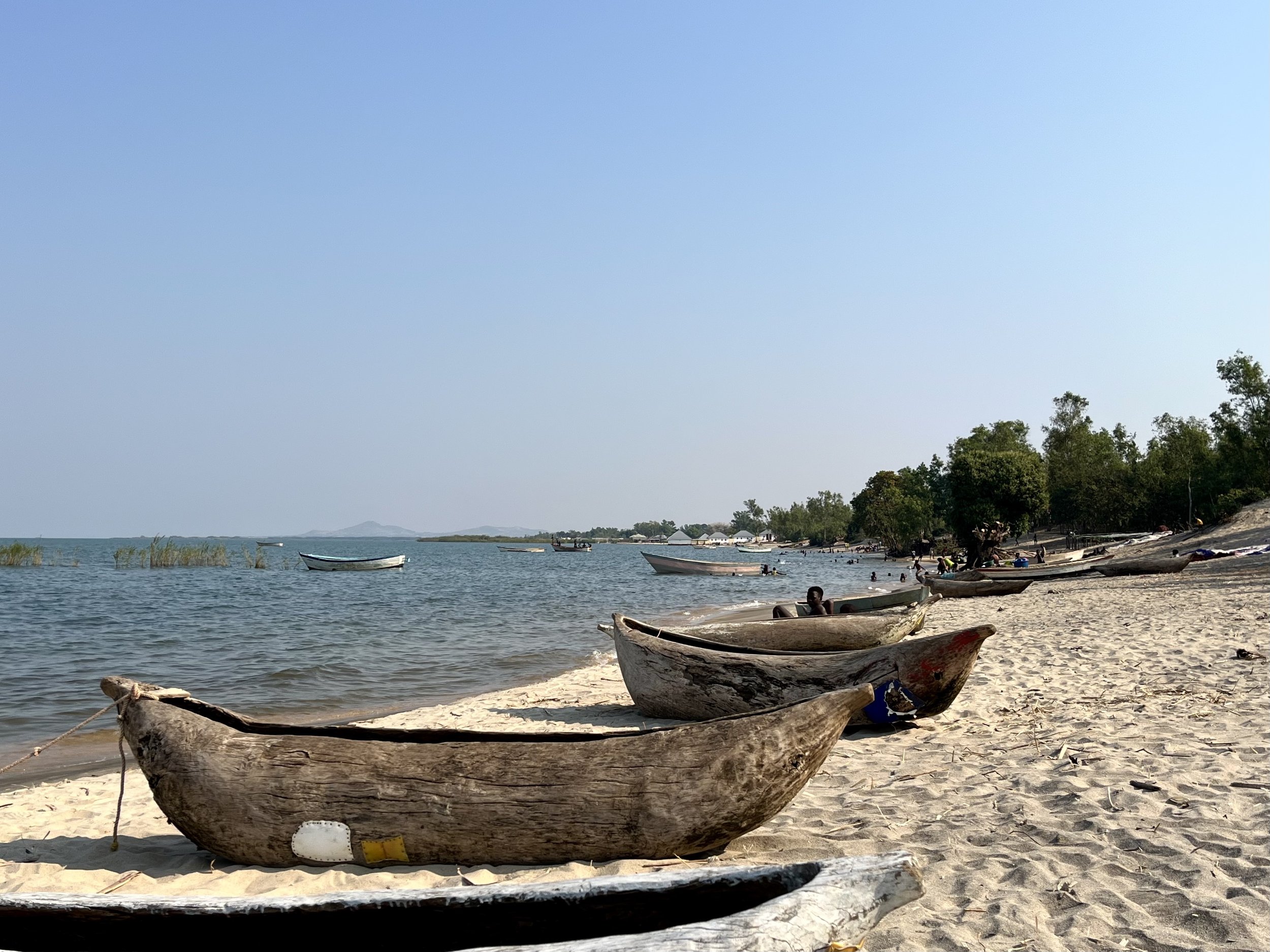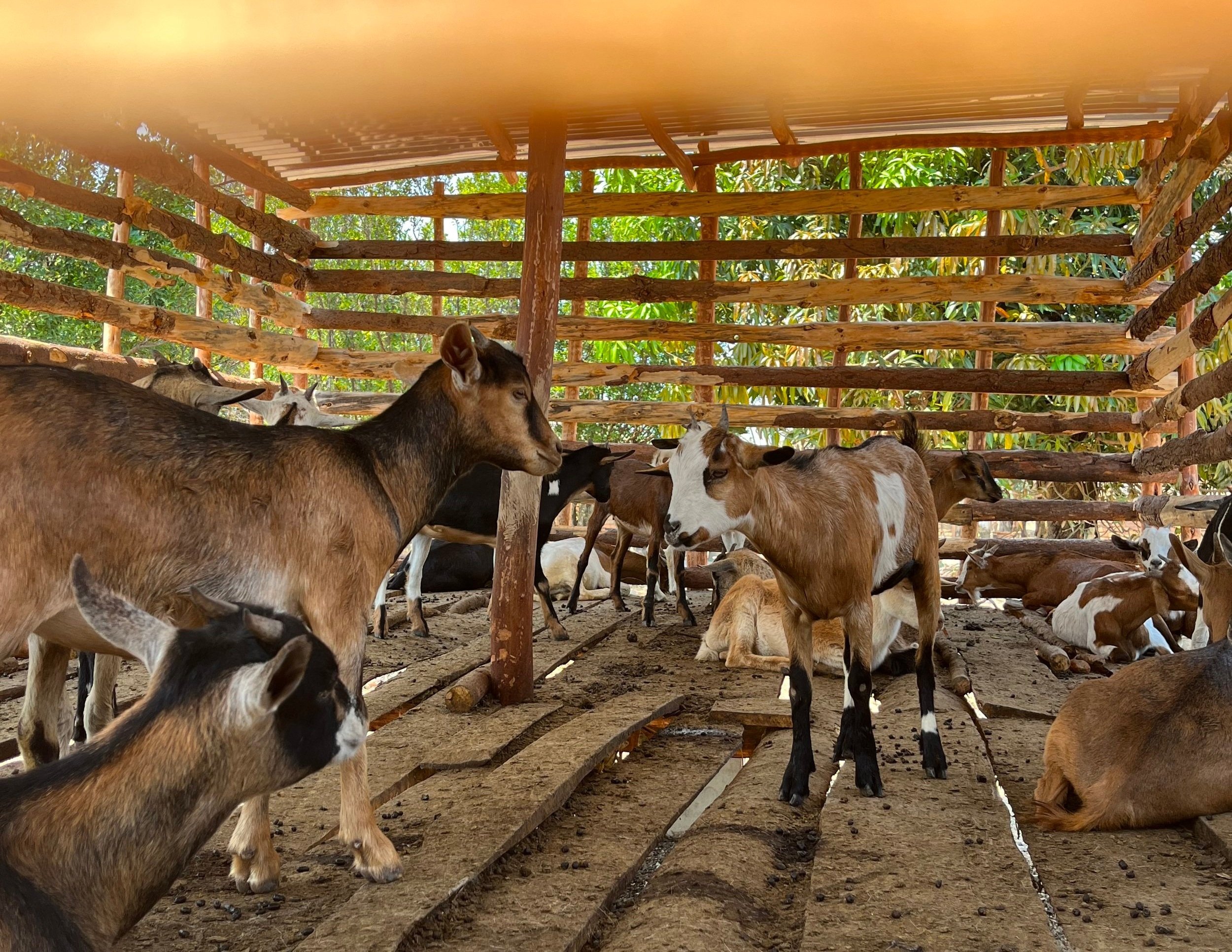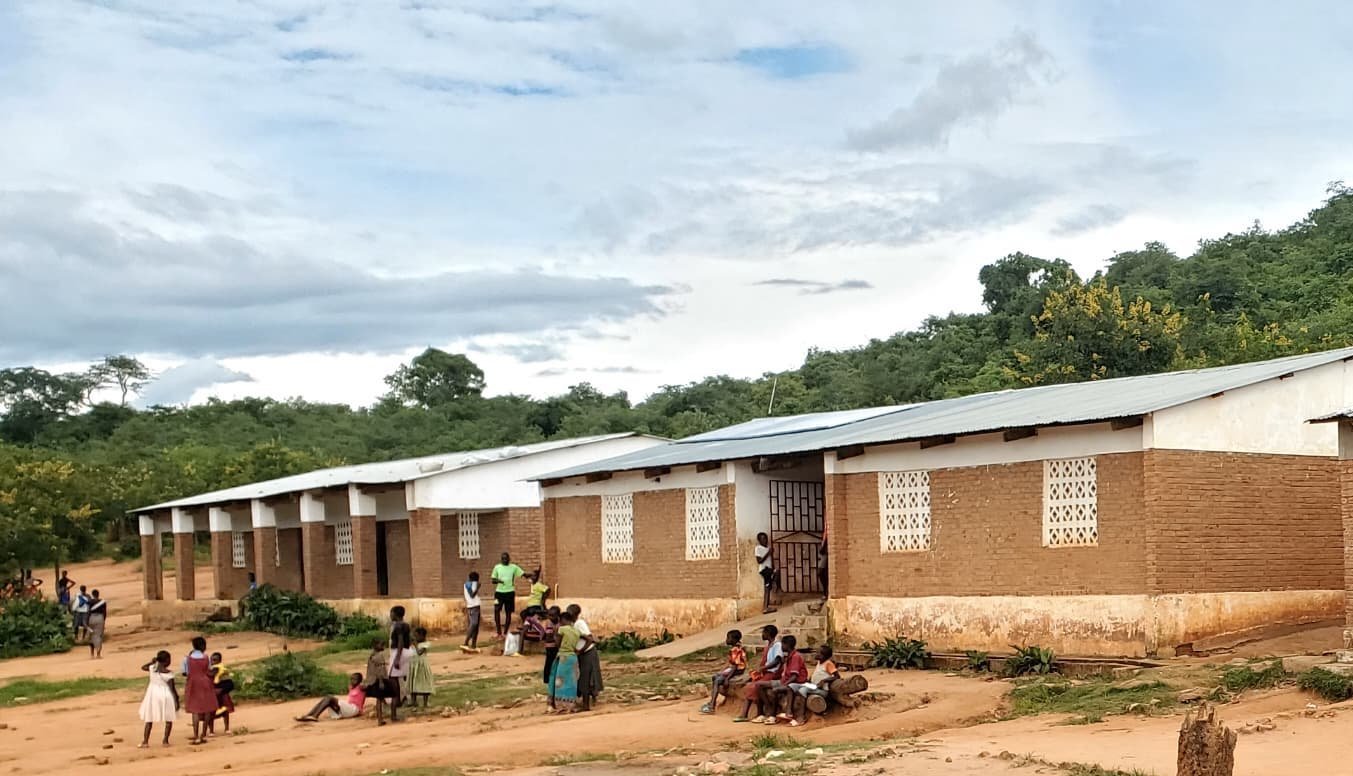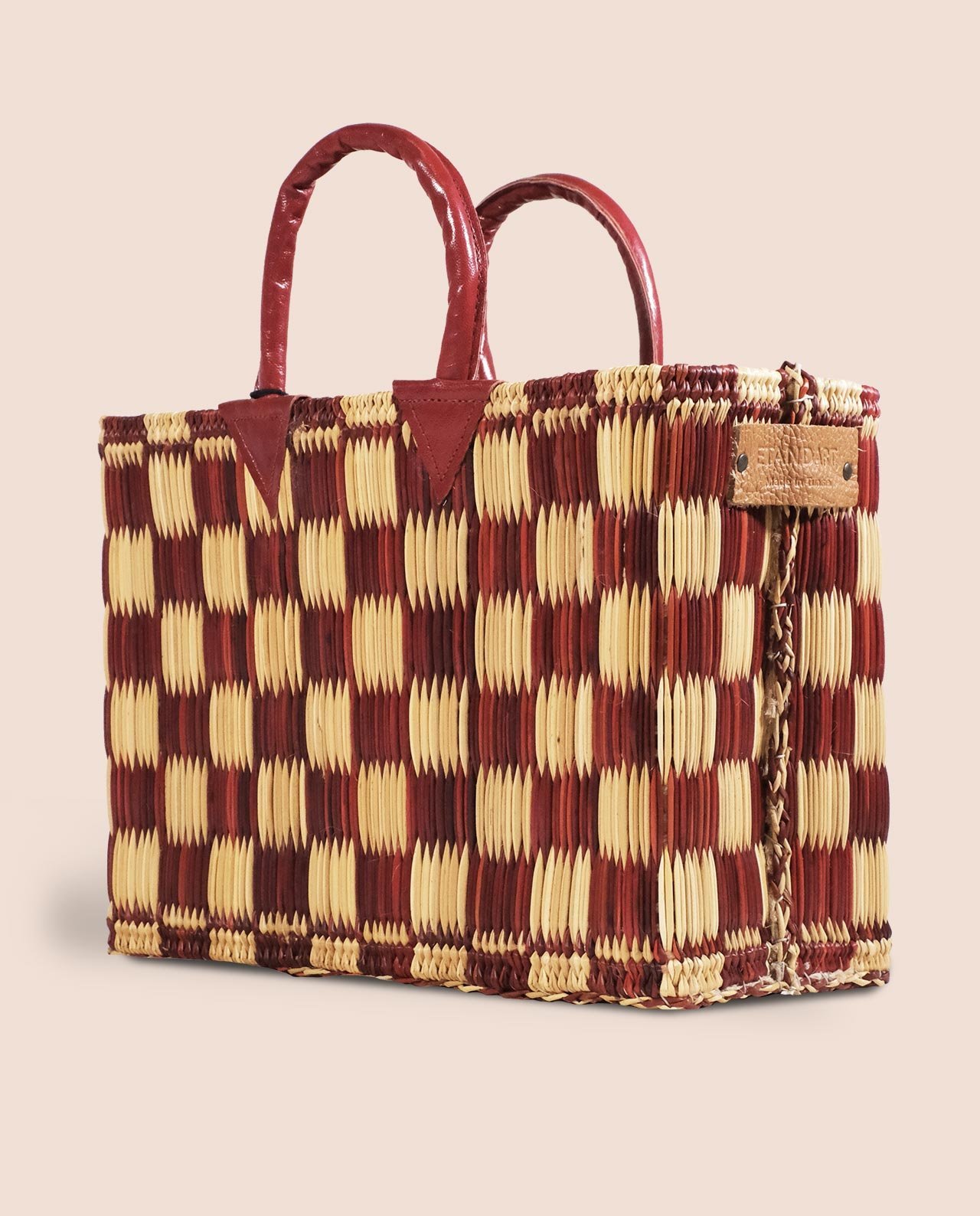2023
A Milestone Year
Take a moment to look back with me and smile.
(Don’t forget the Hobnobs)
Approx: 10 minute read
Contents
A message from Tom Herring
Water & Sanitation
Livelihoods & Food Security
Primary Education
Hope Store
Fundraising
Special Thanks
Looking Ahead

Did the last five years amount to anything?
A message from Tom Herring, CEO.

2023 was marked by some mountain-top moments.
We made some leaps forward with our work in Malawi and had the privilege of more people than ever supporting us on our island.
On the other hand, it is a challenging time for the people we work with, where the economic situation has been causing significant pain.
I am thankful that our strong position has enabled us to provide some shelter in the storm though.
We have been able to maintain and in some cases increase our level of support in communities where people really struggle — not handing things out, but with our partners getting alongside families to help them tackle the root causes of their struggles.
2023 was a milestone year for us. We and our partners completed a five-year programme focused on Economic Empowerment, Nutrition, Water & Sanitation and Primary Education in two project areas in northern and southern Malawi.
We believe in long-term partnership where trust is built through the ups and downs of authentic relationships. We are convinced that it is only then that we successfully help people to realise their potential to thrive. As you will find out below this slow, long-term approach has resulted in tangible changes for children.
From our own monitoring and many personal interactions within target communities, we were confident of the difference we were making. But to demonstrate our progress to others we invited an independent consultant to go into the field with a team and one question:
‘Are children and their families who have benefited from our work over the last 5 years better off now than they would have been without us?’
It is a scary question to ask yourself if everything you have worked toward over past years has amounted to anything at all.
Despite my confidence, I admit that a tiny sigh of relief was released when the report came back demonstrating that these communities are healthier and more prosperous, and that primary schools are experiencing increased enrolment, attendance and performance.
226 project participants were interviewed in person, who all shared accounts of at least one area of their life being turned around.
The beautiful part is that these are long-term changes, and that improvements can continue to happen because of the knowledge and skills that people have learned, which will be passed onto their children.
I hope you enjoy finding out how your involvement with Hope has helped others in 2023 as much as I have enjoyed putting this together.
Thank you so much,
Tom Herring
In 2023 our work directly benefited 10,551 people:
5,045 children
5,506 adults
Significant positive impacts on a further 4,616 children.
Examples of someone benefiting directly are, a child who can now access safe drinking water or a mum who learns how to run a profitable micro enterprise.
An example of someone benefitting indirectly is a child whose parent is accessing important services like a Village Bank and business training.
Water
It is hard to imagine a day without access to clean water, but this is still a reality for many people in our world.
We like to prioritise water because it is relatively easy to have an enormous impact on people’s lives.
Consider the energy and time saved if collecting a pail of water is a 15 minute job rather than an arduous 2 or 3 hour one — not to mention the time and money saved on trips to health clinics because of tummy bugs.
In some cases we are able to pipe water into people’s homes (we currently supply 115 households directly).
Happy Chinyama Village members accessing water within their village for the first time
Our work over the last 5 years in water and sanitation has been found to reduce waterborne infections, free up significant time for women, increase school attendance for girls and reduce household expenses.
In 2023 this directly benefited 2,355 people who have gained access to safe water and/or improved sanitation facilities, on top of the thousands of people who are already benefiting from services extended in previous years.
Our goal was for all households in our impact area to access safe water within 1km of their home. We have achieved 70% of households.
“This community used to experience many cases of diarrhoea. This is no longer the case because of better access to safe water and sanitation.”— Female project participant
An essential component in water supply is sustainability. Drilling a new borehole in a remote village is only the beginning — there are questions that must be answered like, who will maintain the water supply, how will they do it and how will it be resourced?
The approach since 2018 is showing to be a sustainable one, where a water point management committee is trained to manage the water resource — collecting funds from users, making repairs and keeping water points clean and well maintained.
“As a community we raise our own funds through household contributions. These funds are used to buy the spare parts needed.”— Male project participant
Significant efforts were also made in 2023 to increase the capacity of communities to support girls with sustainable menstrual hygiene solutions. Women and girls were trained in making reusable pads, and some have been able to create a business out of it.
Participants of one of many reusable sanitary pad workshops
New girl’s toilet block going up
A handful of students outside a new toilet block
Hope Water Ltd
Hope Water is a social enterprise owned 50% by Hope for a Child. The company supplies piped water to 1,183 households via public and private water points.
Supplying affordable piped water as a commercial company rather than a donor, and to customers rather than aid beneficiaries, is a hugely empowering transition.
We are able to help people access services that are of a higher quality and level of sustainability, whilst being more empowering for communities.
A Hope Water private connection customer
In 2023 we entered a new area of business and invested in a drilling rig. In the second half of the year we drilled 20 boreholes under contract. This area of business is being developed to provide revenue for expanding the piped water system to more users, while providing a crucial service to Malawian communities.
Although a steep learning curve with many challenges met, we are confident that this will be a high impact, fruitful business venture.
Hope Water drilling team
Livelihoods & Food Security
Over the last 5 years our strategy for economic empowerment focused on informal financial services, training in business and agriculture, cooperatives and loans of livestock and seed.
This has been complemented by activities to improve food and nutrition security, such as the distribution of fruit trees, training in nutrition and meal preparation and construction of community grain banks.
As a package, these interventions have had profound impacts on the general welfare of participating families, including the 3,916 households taking part in 2023.
Kang’ung’uza cooperative is venturing into producing sweet potato flour and dried spices. They have been provided with the seed to get started.
The findings of the project evaluation in this area were encouraging. This is what some of the participants have to say…
“We were given bean seed to improve food and nutrition security, which has benefited everyone here. We are now healthy and can afford to sell some of the beans and to support our families and pay school fees for our children.” — Female project participant
“Each household received a goat and two rabbits. This initiative has greatly helped in improving our income and we can support our children. Also these livestock are giving manure for our fields causing increased crop yields.” —Female project participant
A happy pig recipient
Participants spoke about the success of the community grain banks, which have not only united the community but are helping to smooth seasonal volatility of food prices and improve nutrition. These are secure community managed facilities where members can store their harvest, safe from post-harvest damage and theft. We have constructed 3 in the past 5 years and they have been shown to significantly improve household food security.
“With the coming of grain banks, we are able to feed our children and they can concentrate on school. Our children are now healthy.” — Male project participant
Project participants are expressing gratitude for the various cooking lessons received, enabling diet diversification. Excitingly, children have begun to ask their parents for food from the six food groups they have learned about.
“We now understand the importance of balancing our daily food intake and identifying the different food groups. We are more aware of our dietary choices and are working towards improving them.” — Female project participant
“We were taught how to prepare nutritious and affordable meals using local ingredients, for example cassava patties with eggs, onions, and green pepper.” — Female project participant
“Children have learned the importance of having a variety of foods on the plate. They actually remind you when one food group is consistently missing, like fruits.” — Female participant
Village Banks
The evaluation found unanimous agreement among interviewees that access to community-based financial institutions has improved and that as a result economic and social welfare has been impacted tremendously.
Community members claim that they have safe, easy access to loans without collateral as demanded by commercial financial institutions. It was reported that before the formation of the Village Banks, members had difficulty in accessing loans for business or personal use.
In order to get a loan, I had to go from house to house, sometimes revealing my personal information, which was embarrassing and shameful with no guarantee that I could get the loan”. — Female participant
Members of Village Banks are also trained how to invest in income-generating activities to meet household expenses. Some women said they feel a lot freer because they can feed their children without having to continually go to their husbands for money, which is a common source of contention. It was reported that this has improved unity at home with less conflicts.
This is the reason why Village Bank members receive such significant interest on their savings — because the shared pool is continually going out to members on short-term loans, invested in business and repaid with interest.
Members generally earn anywhere from 30% to 150% interest on their savings in 12 months.
Chismo cooperative learning to run a bakery.
“We used to have endless fights in our family, we no longer have these. When I am in need of something, I now don’t beg from my husband, I do it on my own because I have the money which I get from the Village Bank”. — Female participant
The banks really help smooth household cash flow, as individuals can easily borrow money during emergencies like illnesses, and to support their children with school fees and supplies like stationary and school bags.
“Life is now good. When in trouble, we easily go and borrow from our club, this didn’t happen before joining the club”. —Female participant
“The Village Bank has significantly improved our economic welfare. This has enabled us to meet our financial obligations for school fees” — Female participant
“From my savings, I have managed to construct a new house with bricks and iron sheets, the old one has been turned into a kitchen”. — Female participant
“My family is now able to eat a balanced diet and we are a healthy family. This was not possible before joining the club”. — Female participant
Kyton and Ziffa have been investing their Village Bank savings in business activities, and have managed to build themselves a home to be proud of. The last one had a grass roof, which leaked badly in the rainy season. Their little one now has a safe place to call home.
SPRODETA Agribusiness
Through a social enterprise jointly owned with our partner SPRODETA, in 2023 we purchased 55 tonnes of maize, soya, beans, rice and peanuts from 318 smallholders at a fair price, providing them with an important income stream.
The business also trained 387 smallholder farmers in business management and entrepreneurship and provided loans of seed to 296 smallholder farmers.
The Agribusiness team outside the newly constructed processing centre.
Produce purchased from smallholders in storage.
Susan’s experience is an example of how people are benefiting from the integration of business into our work.
Where Susan lives, the norm is for families to struggle to meet their own basic needs like food, safe housing and clean water. As I would, many accept this as their lot — it is what they are used to.
Our partner SPRODETA helped Susan realise this may not have to be the case, enabling her and some fellow community members to establish a Village Bank and learn about saving and investing.
Susan made a plan to save up to invest in a money-making engine that would catapult her family into a new realm of living.
Putting aside a little each week, she accumulated enough to buy all the farming inputs she needed to step up her farming to commercial proportions. She worked hard, and at the end of the season harvested a huge 2.5 tonnes of the staple food crop in her community — maize.
Through the Agribusiness, we purchased about a third of Susan’s produce.
With this income she has rented even more land and purchased more inputs for the next growing season, to step up the enterprise even further. She put the remaining 1.7 tonnes in the community grain bank (also funded with your support) to feed her family for the year.
On top of this, back in 2021 she received a couple of goats with Hope for a Child funds.
She has been taking good care of the animals and they have multiplied greatly. This small livestock enterprise has been providing income enough to improve her house, making it a more spacious, safe place for her family.
Primary Education
Kasangani Primary school blocks
In 2023 our work in primary schools in Malawi benefitted 1,252 children.
3 of the primary schools our partners have worked most closely with in northern Malawi are Kasangani, Nthizi and St Thomas.
We have helped these schools to increase their capacity to cater for more children and reduce drop-out rates. This has been achieved through improved infrastructure like new school blocks, teachers accommodation and toilets and provision of equipment, learning materials and morning meals.
We have also been working to improve the school experience specifically for girls where there are needs for additional support.
Since 2020, enrolment in these 3 schools has increased by an average of 33% across the schools, from 951 students to 1,269.
This is due to a number of factors, like increased capacity, improved facilities, school meals and shifting mindsets of parents who in the past have kept children home to work.
Visiting one of the new teachers’ houses at Nthize School
Start Smart Academy
We are always looking for sustainable self-funding models in our work.
When we partner with people to help them address challenges in their community, we are asking, how will this carry on without further grant funding?
After a few years, can this continue to deliver an increasing level of impact if funding stops or shifts to a more commercial model?
Start Smart children enjoying the playground.
Start Smart was started with the vision of providing quality care and education opportunities to vulnerable pre and primary aged children.
In 2023 the centre saw a lot of progress with our help — it acquired land, constructed a school block and water source, purchased equipment and hired new staff.
The input the centre provides to children is of a high level, so it attracts families who are happy to pay fees typical of private schools.
The remaining 50% or so of the places are subsidised for vulnerable children from surrounding villages.
Hope Store
Some of the weavers in Malawi who supply Hope Store.
2023 was a beautiful year for Hope Store. It was so much fun for us to meet many of you in the shop.
Hope Store is designed to support artisans and their families in Malawi and elsewhere, by retailing their products to lovers of quality natural homeware and self-care products in Guernsey.
We were delighted to hit our sales target for the year, meaning that many households in Malawi, Ethiopia, Tunisia were supported. We are also happy to be able to support local artists — Ellie Atkinson’s artwork depicting local scenes has become very popular among our customers.
We are very excited that we are now able to retail to the UK through the Hope Store website, which is now live. Yippee!
Natural scented candles from Greece
Tunisian rush bag
Majorcan glass. Hand blown, recycled.

Fundraising
We have been increasingly positioning ourselves over the years as a charitable company which, instead of asking the public for donations, raises funds using a more commercial model. We offer goods and services to our community in return for payment, such as a chance to win an amazing prize or to purchase a product from Hope Store.
Our community seems to really enjoy this approach, and in our minds it is a healthier and more sustainable way to generate the cash we need to achieve our aims.
One of the things I particularly love about the way we raise funds is that we are able to apply 100% of any donation we do receive directly to our work in Malawi, because our overheads are already covered by our other income streams.
In 2023 we generated income through The Big Summer Lottery, The £5 Lottery Club, Hope store and a grant.
We are thankful to have received £50,000 from the Guernsey Overseas Aid & Development Commission to help 4,000 people considered most vulnerable to the severe flooding caused by Tropical Storm Freddy in Malawi.
The £5 Lottery Club
The £5 Lottery Club is Guernsey’s most fun and rewarding regular prize-winning opportunity. It is thrilling sending out thousands of pounds to happy winners every single month. In 2023 we sent out over £50,000 in prizes.
The club is an engine that keeps Hope for a Child running, enabling us to meet critical core costs and invest in communities in Malawi. With the proceeds we also support organisations benefiting children in Guernsey — Friend’s of Frossard Children’s Ward, Action for Children and Every Child Our Future.
In 2023 we welcomed another batch of members — there are now around 4,500 numbers in the monthly draw — raising over £200,000 over the year.
The draw takes place on the 23rd of each month when 100 winning numbers are drawn, including a top prize of £1,000 - except in May and November when the top prize is boosted to £3,000!
Find out more and join the waiting list HERE (we will be opening the doors to new members soon)
The Big Summer Lottery
The Big Summer Lottery 2023 was a lot of fun as always, not only for the 50 chirpy winners but for our amazing team running it.
We always get so much great feedback from the event.
We gave away £184,500 in prizes in 2023, including a top prize of £100,000.
The draw raised over £370,000 for Hope for a Child, which we are using to invest in communities in Malawi, meet our core operating costs and support charities benefiting children in Guernsey — we were able to donate £25,500 from the proceeds to Autism Guernsey, Trauma Recovery Centre, Guernsey Arts Commission and Action for Children.
Special Thanks
We could not have achieved any of the above without our wonderful partners in Malawi — SPRODETA, Rhema Institute for Development & FOCCAD.
We strongly believe in empowering local people to lead change in their own communities, and as a result all our work is delivered by our local partners.
We are also indebted to our wonderful Hope Team in Guernsey, who work passionately and tirelessly to raise funds and ensure we are achieving our aims in Malawi.
Last but far from least, without the generosity of our supporters we could achieve very little — if you took part in The Big Summer Lottery, The £5 Lottery Club or purchased something from Hope Store in 2022, we can’t thank you enough.

Looking Forward
With every year that passes we become increasingly obsessed with sustainability.
We are not interested in helping anyone to build something that cannot continue to empower people without our presence.
We want real freedom for people living in poverty.
To us that looks like individuals, families and communities not only being able to meet their own needs on their own terms but actively dreaming and shaping the future.
As a result, our resources are being increasingly focused directly on or to support our social enterprises in Malawi. These businesses support smallholder farmers, supply safe water and care for vulnerable children… With more in the pipeline!
I have so much hope in the compassionate business approach for many reasons, but I will quickly share 2:
Firstly — from our experience we know that the level of sustainability and quality of service that must exist in order for a business to be profitable cannot be replicated in the long term using a traditional charitable model — I can’t count the number of times I have come across once working infrastructure projects constructed by charities and NGOs that have fallen into disrepair.
Secondly — any healthy business cannot exist in a vacuum. It requires healthy, solvent suppliers and customers and working infrastructure etc. If these don’t exist, a business is required to invest in the community to help create the environment required for the business to thrive.
Where the needs are great it is likely to be too costly for a normal businesses to achieve this. This is one of the reasons why weak economies get stuck.
This is where ‘compassionate business’ comes in. What if charities who are used to giving away funds, instead invest that cash into high-impact social enterprises, designed to achieve the charities aims? Because there is no requirement for a fast return on investment for shareholders, a slow approach can be taken to help create the right environment for the business to function. This ends up improving the lives of everyone in the community.
For example, if we buy grain from farmers, we need them to be healthy and producing high quality crops. This often requires a significant amount of training and investment in things like local water supply and roads.
There is a lot to consider and different skills and ways of thinking are required, but it is in this area that I think there is enormous opportunity. Our efforts, so far anyway, are showing great promise.
We are very excited about what 2024 holds!
Don't miss out on upcoming events and success stories:
Questions, comments or suggestions? We would love to hear from you. Email: tom@hope.gg
Hope For a Child is a charity registered in Guernsey No: 291























